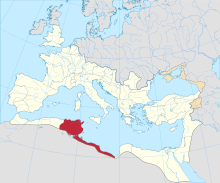
Tulana also known as Tulanensis was a civitas (town) of the province of Africa Proconsularis[1] during the Roman Empire.
Very little is known of the town. Its location is now lost and the town is recorded only through the Notitia of Africa and the records of various Church Council. We know of a bishop of the town called Paul in the early 5th century and another named Pascasius who was exiled by the Vandal king Huneric in 484 AD.[2][3][4] The ancient bishopric survives today as a titular see of the Roman Catholic Church and Otacilio Ferreira de Lacerda is the current bishop replacing Heinrich Timmerevers, in 2016.[5]
References[edit]
- ^ Titular Episcopal See of Tulana at GCatholic.org.
- ^ Acta sanctorum: Acta Sanctorum Maii, Volume 18.
- ^ Jean Hardouin, Claude Rigaud (París), Acta conciliorum et epistolae decretales ac constitutiones summorum pontificum (Ex Typographia Regia, 1715) p6.
- ^ Johann Albert Fabricius, Jo. Alberti Fabricii SS. Theologiæ D. & Prof. Publ. Bibliotheca ..., Volume 12 (Sumptu Christiani Liebezeit, 1724) p140.
- ^ Le Petit Episcopologe, Issue 164, Number 14,038.
Well, that’s interesting to know that Psilotum nudum are known as whisk ferns. Psilotum nudum is the commoner species of the two. While the P. flaccidum is a rare species and is found in the tropical islands. Both the species are usually epiphytic in habit and grow upon tree ferns. These species may also be terrestrial and grow in humus or in the crevices of the rocks.
View the detailed Guide of Psilotum nudum: Detailed Study Of Psilotum Nudum (Whisk Fern), Classification, Anatomy, Reproduction